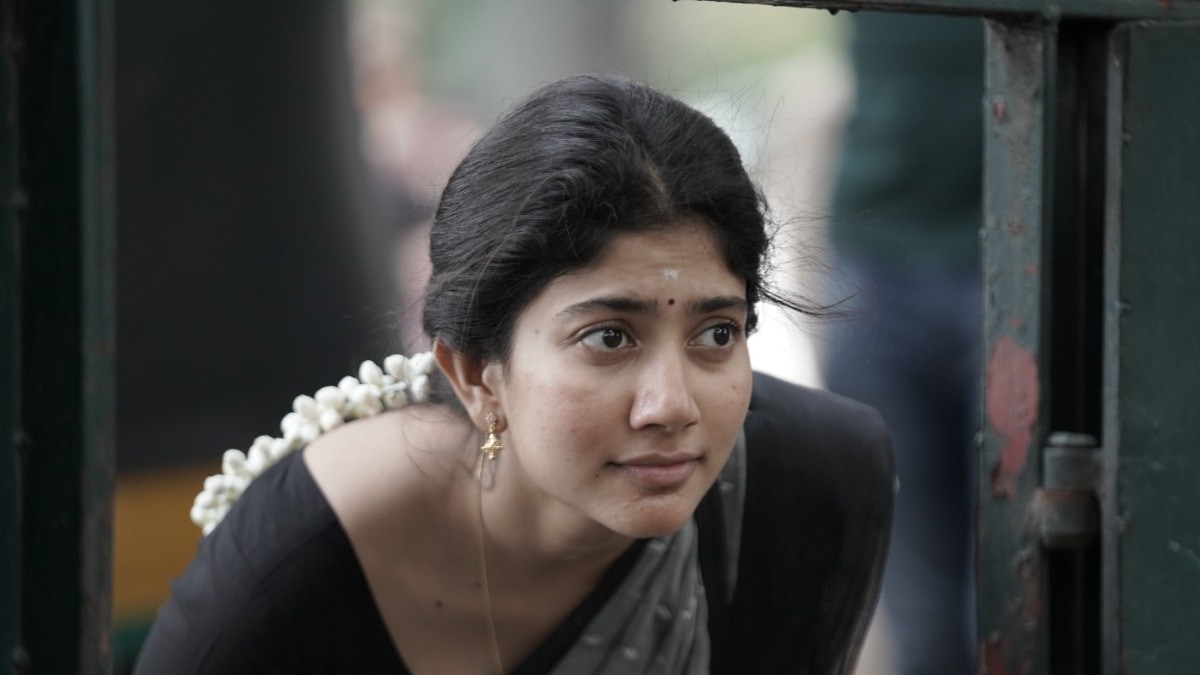Gargi review: A superb Sai Pallavi and a terrific Kaali Venkat elevate this sensitively-told drama
The story of Gargi, directed by Gautham Ramachandran, is quite relatable in that it could happen to any one of us.
Jul 23, 2022

Sai Pallavi in Gargi
Plot: There is so much to write home about in this Gautham Ramachandran directorial. Gargi (Sai Pallavi) is from a lower-middle-class household. She is a teacher, who has no lofty goals in life. She's happy taking tuition in the evening and looks forward to her marriage. The film follows the protagonist’s persistent fight to free her father, Brahmananda (a frail-looking RS Shivaji), a security guard in a small housing society, who is jailed in a gang rape case, involving a minor girl. Gargi has a little sister, and her mum sells idli batter to support the family.
Review: The film opens with Gargi invigilating an exam. You are shown how she’s fiercely protective of her father. When her fiance informs her over the phone that his family has dowry expectations, Gargi's first thought is that she cannot burden her father any further. First, when we listen to the news of her father being taken away by cops, the camera does not instantly show Brahmananda. Gautham Ramachandran makes us wait for RS Shivaji to appear. Those situations are well staged. Gargi is at a loss about what to do next. She's confused. She becomes numb with shock and embarrassment, taking her time to react, like the majority of women do. She breaks down. But she was dead sure her father wouldn’t be the accused. We are shown why she states so. Those portions appear in black and white. Gargi’s father saves her from a creepy teacher, who tries to molest her. How can her ‘hero’ commit such a heinous crime? Well…
The background soundtrack emphasises the mounting catastrophe which unfolds on the screen—it's brilliantly crafted to convince us of Gargi's battle for justice. After an episode concerning child sexual assault, Gargi washes cow manure off her walls. We are also told why she dreads yellow colour. These types of details can be seen throughout. The film's writing is deep and thoughtful. Gargi has the feel of a thriller, but it is not one. Following the intermission, the film offers potential suspects. Every man on the screen looks to be the one at some moment. The Sai Pallavi-starrer is proof of the lawyer-turned-filmmaker Gautham Ramachandran's control over craft and form.
You already know what’s going to happen, but "the how" has been executed beautifully. Sai Pallavi absorbs Gargi like a sponge. Helplessness. Fear. Shame. Guilt. The actor conveys every emotion through her eyes, and every expression was on point!
The film is cautious about which side it takes. Until the very end, the victim, a minor, is never seen or named. It waits until the perpetrator's guilt is established beyond a reasonable doubt in court before passing judgement.
Indrans (Kaali Venkat), a junior lawyer, comes to Gargi's rescue. He stutters. And he's never handled a case before. This is his first. Gargi had no choice but to trust him. It's mind-blowing how every character ends up being crucial to the plot. The past and present collide to unveil the characters over time, much like a photographic film strip slowly reveals its whole image in a dark room.
Govind Vasantha's music fills the gap of meaning in the universe, even if it might be a little too loud in its attempt to be convincing at times. Shafique Mohamed Ali cuts the film tightly without interfering with the audience's ability to absorb the drama. The film's dialogues convey a lot without melodrama; mirroring reality. A couple of my favourite lines: “It’s not about what you know, but what you can prove” and “enna ava Appa-vaa paakala, verum ambalaiya paakraa.” (My daughter doesn’t see me as a father anymore. I’m just another man to her). How powerful they sound, on screen!
Sraiyanti and Premkrishna Akkattu's cinematography is an asset. The camera is intimate but not intrusive—seemingly a silent fly on the wall. The narrative flows with twists, adding to our anxiety and intrigue. Gargi asks a senior lawyer, in the beginning: “Naan ippo enna pannanum”, without having to overreact. This is where the film holds significance—in how they organically mount the events despite dealing with an issue of this magnitude. The incidents let Gargi learn it herself. What makes Gargi work is the performances of actors all around—Saravanan, RS Shivaji, Kavithalaya Krishnan (who plays the senior lawyer), Livingston, and Dr Sudha, as the judge. Oh, I loved her, when she said, “I am the best person to judge this case, as I know both—the arrogance of a man, and the pain of a woman.”
Gautham Ramachandran makes sure that Sai Pallavi is never lost in an inflated version of womanhood and portrays her as an individual with enormous inner strength. Gargi doesn’t wallow in self-pity, but stands up and takes control of her life, when everything turns upside down. The film has its heart in the right place. And, it shows. Undoubtedly, Gargi is Sai Pallavi’s career best. Often, her eyes reflect hurt and hope in equal measures, giving you the impression that this woman will not buckle under the pressure of patriarchy. The closing moments of the film might move you to tears.
Verdict: The film equally belongs to Govind Vasantha as his background score complements the narrative style, even in silence. Gautham Ramachandran effectively conveys what he seeks to, making Gargi one of the most important films of this year. Despite the message-heavy tone, Gargi is touching. Taking such a cliched narrative and turning it into a gripping watch is truly an art!
Gargi is running in theatres.
Share